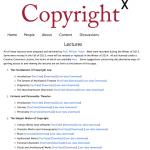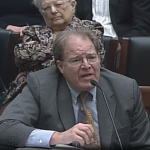The public meeting has been postponed until Dec. 12, but the public comment deadline remains the same, Nov. 13th. The Department of Commerce is soliciting input on the Internet Policy Task Force’s green paper, “Copyright Policy, Creativity, and Innovation in the Digital Economy,” produced by the USPTO and the National Telecommunications and Information Administration (NTIA).
Questions from the Federal Register Oct. 3, 2013
Remixes
1. Is the creation of remixes being unacceptably impeded by this uncertainty? If not, why not? If so, how? In what way would clearer legal options result in even more valuable creativity?
2. In what ways, if any, can right holders be efficiently compensated for this form of value in cases where fair use does not apply?
3. What licensing mechanisms currently exist, or are currently under development, for remixes and for which categories of works?
4. Can more widespread implementation of intermediary licensing, such as YouTube’s Content ID system, play a constructive role? If so, how? If not, why not?
5. Should alternatives such as microlicensing to individual consumers, a compulsory license, or a specific exception be considered? Why or why not?
6. What specific changes to the law, if any, should be considered? To what extent are there approaches that do not require legislation that could constructively address these issues?
First Sale
7. What are the benefits of the first sale doctrine? And to what extent are those benefits currently being experienced in the digital marketplace?
8. To what extent does the online market today provide opportunities to engage in actions made possible by the first sale doctrine in the analog world, such as sharing favorite books with friends, or enabling the availability of less-than-full-price versions to students? 9. If the market does not currently provide such opportunities, will it do so in the near future? If not, are there alternative means to incorporate the benefits of the first sale doctrine in the digital marketplace? How would adoption of those alternatives impact the markets for copyrighted works?
10. Are there any changes in technological capabilities since the Copyright Office’s 2001 conclusions that should be considered? If so, what are they? For example, could some technologies ensure that the original copy of a work no longer exists after it has been redistributed?
11. To what extent are there particular market segments or categories of users that may warrant particularized legal treatment?
12. How will the Supreme Court’s decision in Kirtsaeng v. John Wiley & Sons, Inc., 133 S.Ct. 1351 (2013), impact the ability of right holders to offer their works at different prices and different times in different online markets? How will any such changes impact the availability of and access to creative content in the United States and elsewhere?
Statutory Damages
13. To what extent is application of the current range of statutory damages necessary for effective deterrence with respect to (a) direct infringement by individual file sharers and (b) secondary liability by online services?
14. Is the potential availability of statutory damages against online
services for large scale secondary infringement hindering the development of new, legitimate services or platforms for delivering content? If so, how? What is the evidence of any such impact?
15. If statutory damages for individual file sharers and/or services found secondarily liable for infringement were to be recalibrated, how should that be accomplished? Would legislation be required?
Government Role in Improving the Online Licensing Environment
16. What are the biggest obstacles to improving access to and standardizing rights ownership information? How can the government best work with the private sector to overcome those obstacles?
17. To what extent is a lack of access to standardized, comprehensive, and reliable rights information impeding the growth of the online marketplace? What approaches could be taken to improve the situation?
18. Are there other obstacles that exist to developing a more robust, effective, or comprehensive online licensing environment? If so, what are they?
19. In addition to those efforts to develop standardized, comprehensive, and reliable rights databases and online licensing platforms described in the Green Paper, are there other efforts under way by the private sector or public entities outside the United States? If so, what are they?
20. Would a central, online licensing platform for high-volume, low-value uses (a ‘‘copyright hub’’) be a useful endeavor in the United States? If not, why not? If so, how can the government support such a project?
21. What role should the United States government play in international initiatives at WIPO or elsewhere?
Operation of the DMCA Notice and Takedown System
22. The Task Force believes that at least the following issues could be constructively addressed through a notice and takedown multistakeholder dialogue:
a. Reducing the volume of takedown notices sent to service providers;
b. Minimizing reappearance of infringing material;
c. Inaccurate takedown requests;
d. Misuse of takedown requests; and e. Difficulties in using the system for
individuals or small and medium-size enterprises (SME).
What other issues could be considered? For each issue to be considered, who are the stakeholders needed at the table?
23. How can the Task Force ensure participation by all relevant stakeholders, as well as effective and informed representation of their interests?
24. Are there lessons from existing multistakeholder processes in the realms of Internet policy, intellectual property policy, or technical standard- setting that could be applied here? If so, what are they and to what extent are they applicable?
25. In what ways could the stakeholder discussions be structured to best facilitate consensus?

